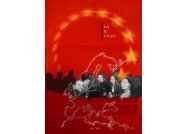turkish-greek civic dialogue - AEGEE Europe
turkish-greek civic dialogue - AEGEE Europe
turkish-greek civic dialogue - AEGEE Europe
Create successful ePaper yourself
Turn your PDF publications into a flip-book with our unique Google optimized e-Paper software.
132<br />
......................................................................................................Burcu Becermen<br />
Turkish-Greek Civic Dialogue<br />
Project Manager, <strong>AEGEE</strong>-Ankara<br />
Seeing all these academics and well-noted<br />
personalities here in this room excites me a lot. As<br />
we, members of <strong>AEGEE</strong>-Ankara (<strong>Europe</strong>an Students’<br />
Forum), were keeping on with our activities open<br />
to all university students in Ankara and carrying out<br />
projects in the field of culture of peace; we were<br />
very glad to meet a group formed by immigrants<br />
dealing with the peace culture as well. We were<br />
young and desired to do our humble contribution<br />
and to learn more, whereas there was now another<br />
organisation having much more experience whose<br />
members suffered directly from this subject and now<br />
are trying to preserve their cultural heritage.<br />
Finally, when these two organisations met, our initiatives and desires about<br />
culture of peace became true under the scope of Turkish-Greek Civic Dialogue<br />
Project. It is meaningful that this is the eightieth year of population exchange<br />
and I hope that the subjects that will be discussed here in social, cultural<br />
aspects and about the place of exchange in literature will provide us to be<br />
partners and will give us ideas about the contents of our future activities.<br />
INTERNATIONAL HERALD TRIBUNE:<br />
GREEK-TURKISH CULTURAL BRIDGES:<br />
AEGEAN PEOPLES BEGIN TO SHARE<br />
STORIES AGAIN<br />
Bruce Clark IHT,<br />
December 10, 2003, ATHENS<br />
As the people of Istanbul recover from the deep shock of the terrorist attacks<br />
last month, a blockbuster film in neighboring Greece is reminding people of<br />
that city’s extraordinary tradition of ethnic diversity and coexistence. With<br />
nearly a million tickets sold in a few weeks, “A Touch of Spice” may yet become<br />
the most popular Greek movie of all time. Its theme is the symbiosis between<br />
Turks, Greeks and other ethnic groups that flourished until recently, and never<br />
quite disappeared, in the great conurbation on the Bosporus.<br />
The protagonist is a Greek who is forced to leave Istanbul, along with most of<br />
his family, as a small boy but pines ever after for his home town, the Turkish<br />
girl who was his childhood playmate, and the Oriental cuisine prepared by his<br />
grandfather. As the old man taught him, sweet and spicy flavors can be mixed<br />
in many ways, and they taste better in combination than they would alone.<br />
While the script has its share of stereotypes, it presents a more subtle picture<br />
of the Aegean peoples than “My Big Fat Greek Wedding,” in which American<br />
moviegoers were introduced to Greek pride at its silliest. The new film’s<br />
extraordinary resonance in Greece may seem surprising to those who assume<br />
that the relationship between Turks and Hellenes is merely one of atavistic fear<br />
and suspicion.<br />
Those sentiments exist, but they are mixed with a curious mutual fascination,<br />
born out of shared collective memories, which can be sweet as well as painful.<br />
Whenever political conditions allow, this deep sense of commonality between<br />
the Aegean peoples finds expression.<br />
What the new movie also brings home is that in this region, the advent of<br />
modernity has not led to tolerance or cosmopolitanism; it has turned subtle,<br />
complex places into homogenous ones, where variety of ethnicity, language<br />
and religion are more likely to be viewed as strategic problems rather than as<br />
cultural assets.<br />
That story is still unfolding: in the Balkans and Trans-Caucasus, we are still<br />
observing the collapse of multinational empires into prickly nation-states. Nor<br />
is the end result clear: Will the peoples who once coexisted under Ottoman<br />
or Communist rule find a new way of living together, or will they nurse their<br />
grievances until the next round of conflict? In shaping that outcome, culture<br />
can play a huge, constructive part: films, novels and songs articulate truths<br />
of which politicians or soldiers cannot easily speak. While the business of<br />
presidents and generals is to draw lines and enforce them, art can deal with<br />
ambivalence, worlds that overlap and boundaries that blur. And in that most<br />
ambivalent of all post-Ottoman relationships, between Greeks and Turks, the<br />
role of culture has never been so important.<br />
Population Exchange Association des Etats Généraux des Etudiants de L’<strong>Europe</strong>







